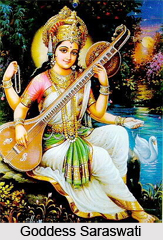 The mysteries surrounding speech speaks of the typical characteristics of Goddess Vac. Vac means speech. It is believed that Goddess Vac inspires truth. Her numinous presence helps one to hear, grasp and see thereby expressing the true nature of things through words. She is the prompter and vehicle of expression. She is associated with rsis and the rituals that can capture the truth of their visions. She is an important part of religious poetic visionary experience of the sacrificial rituals.
The mysteries surrounding speech speaks of the typical characteristics of Goddess Vac. Vac means speech. It is believed that Goddess Vac inspires truth. Her numinous presence helps one to hear, grasp and see thereby expressing the true nature of things through words. She is the prompter and vehicle of expression. She is associated with rsis and the rituals that can capture the truth of their visions. She is an important part of religious poetic visionary experience of the sacrificial rituals.
She is considered as the provider of vision. Goddess Vac is considered as a heavenly queen, the queen of the Gods. She is known to bestow important powers. She is elucidated as an elegant woman, courtly and adorned with gold. She is benign and copious. She endows the riches of language as well as is praised for giving light and energy. According to a hymn she is the provider of food. She is a nourishing and pervasive deity. She stimulates organic growth thereby providing blessings of language and vision. At times she is also invoked as heavenly cow who gives nourishment to Gods and men.
She is also considered as mother as it is she who gives birth to things by naming them. Vac is considered as bounteous who provides lofty discerning vision of rsi, ritual formulas of priest, colloquial language of people. In the Brahmanas her character is well developed. There she is associated with ritual and creation. Her vitality in ritual and cults has been emphasized in myths.
As she is also considered as the creator it is believed that she has created the three Vedas. The three are the Rig Veda, Yajur Veda and Sama veda. She is also known to have entered the place of vegetation thus enlivening it. In other texts Prajapati is considered to have given birth to Goddess Vac.
In the Vedas Vac plays a major role. It is suggested that she is co eternal with Prajapati. It does seem from these texts that they have an exalted position. Vac is described in the Rig Veda as speech, truth and perception which allows one to turn divine knowledge into words. Eventually she was synchronized with the Goddess Saraswati, ruler of knowledge. Vac is the source of knowledge and the ability to communicate it to others.




















